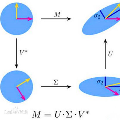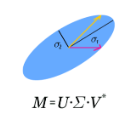In this work we introduce a novel stochastic algorithm dubbed SNIPS, which draws samples from the posterior distribution of any linear inverse problem, where the observation is assumed to be contaminated by additive white Gaussian noise. Our solution incorporates ideas from Langevin dynamics and Newton's method, and exploits a pre-trained minimum mean squared error (MMSE) Gaussian denoiser. The proposed approach relies on an intricate derivation of the posterior score function that includes a singular value decomposition (SVD) of the degradation operator, in order to obtain a tractable iterative algorithm for the desired sampling. Due to its stochasticity, the algorithm can produce multiple high perceptual quality samples for the same noisy observation. We demonstrate the abilities of the proposed paradigm for image deblurring, super-resolution, and compressive sensing. We show that the samples produced are sharp, detailed and consistent with the given measurements, and their diversity exposes the inherent uncertainty in the inverse problem being solved.
翻译:在这项工作中,我们引入了一种叫作SNIPS的新颖的随机算法,它从任何线性反问题的后方分布中抽取样本,假设观测被添加的白高地噪音污染。我们的解决方案包含来自Langevin动力学和牛顿方法的想法,并且利用了预先训练的最低平均正方差(MMSE)Gaussian denoiser。提议的方法依赖于对后方分函数的复杂衍生,其中包括降解操作员的单值分解(SVD),以便获得一个可移动的迭代算法(SVD),用于想要的取样。由于其随机性,算法可以产生多个高感官质量的样本,用于同样的噪音观测。我们展示了拟议的图像分解、超分辨率和压缩感测模型的能力。我们显示,所生产的样本非常精细,与给定的测量结果一致,其多样性暴露了正反问题的内在不确定性。



